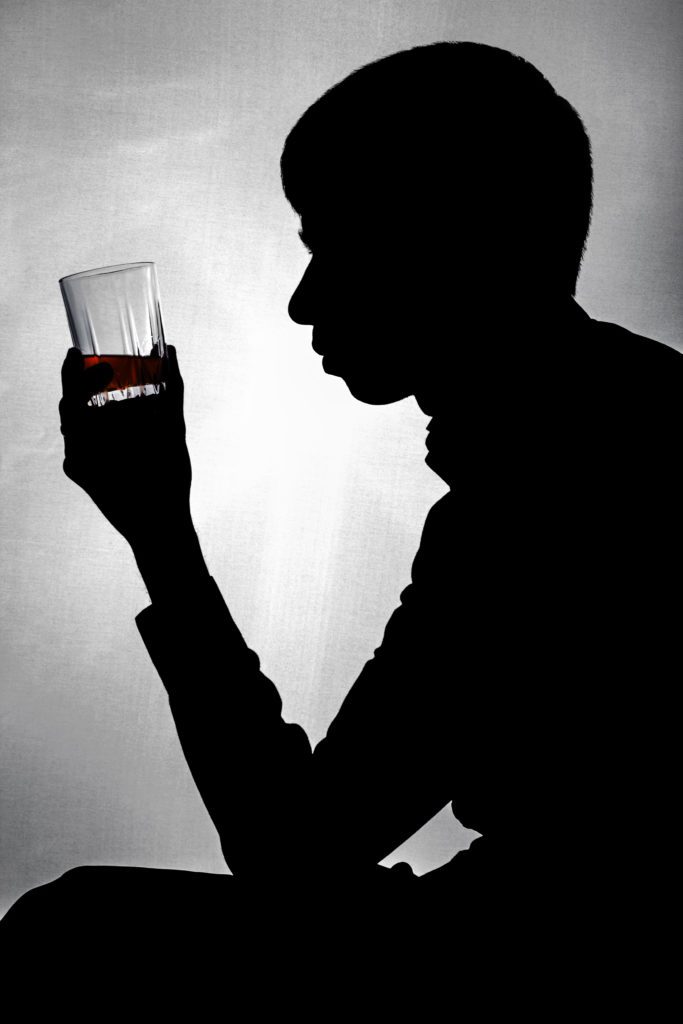Alcoholism in Men
Alcohol is a drug.
Let’s start from there.
Even though both men and women drink, men are more likely to develop an alcohol use disorder. A 2019 National Survey on Drug Use and Health (NSDUH) showed that of the nearly 15 million people with an alcohol use disorder (AUD), men made up 9 million.
Among the most widely accepted and socially normalized intoxicating substances, alcohol is seemingly ever-present in our culture and daily lives. From beer commercials equating alcohol with good times, great friends and even fitness to champagne toasts or knocking back a few cold ones with the boys during the game, drinking is quietly enmeshed with so many of the things you love.
A couple of drinks with dinner, a birthday celebration or a networking happy hour, alcohol is intertwined into seemingly every facet of society.
It’s just considered so utterly normal that we forget that it’s a drug and one that can easily become habit-forming. Leading to dependency, abuse and, if left unchecked, eventually an alcohol use disorder.
While alcoholism isn’t a uniquely male problem, it does disproportionately affect men.

An Introduction to Alcohol Abuse in Men
The stats for men are more grim than for women unfortunately.
From the Centers for Disease Control and Prevention (CDC):
- Almost 59% of adult men report drinking alcohol in the past 30 days compared with 47% of adult women
- Men are almost 2x more likely to binge drink than women
- Approximately 22% of men report binge drinking and on average do so 5 times a month, consuming 8 drinks per binge.
- In 2019, 7% of men had an alcohol use disorder compared with 4% of women
- Nearly 3 of 4 deaths from excessive drinking are among males – totaling roughly 68,000 deaths per year
What exactly quantifies and qualifies alcohol abuse and alcoholism though?
First, alcoholism is the colloquial term for an alcohol use disorder or AUD and an AUD is defined by the National Institute on Alcohol Abuse and Alcoholism as a medical condition characterized by an impaired ability to stop or control alcohol use despite adverse social, occupational, or health consequences.
An alcohol use disorder is diagnosed along a spectrum, from mild to moderate to severe. More on that later though.
It’s worth addressing what terms like moderate, heavy and binge drinking mean for men because the numbers might surprise you and can help shine some light on if a man in your life is on the way towards bigger problems.
According to the CDC:
- Moderate Drinking – 2 drinks or less in a day
- Heavy Drinking – 15 drinks or more per week
- Binge Drinking – 5 or more drinks on a single occasion, generally within 2 hours that brings the blood alcohol concentration to above .08%
Notice that if someone is drinking moderately – just two drinks – but doing so every day of the week, it’s more or less considered heavy drinking. It might not indicate an immediate problem but these numbers indicate what is often a stark disconnect between what we, or a drinker, considers “normal” and what the science and research-informed guidance suggest.
Men and Alcohol: Why Males Are Prone to Alcoholism
A study spanning 10 years and stretching to 35 countries around the world sought to discover, among other things, if there was a consistent difference between how men and women drink.
Their findings indicated that “wherever in the world research is carried out, the answers to this question are consistently that men are more likely to consume alcohol than women are; male drinkers consume larger quantities of alcohol than female drinkers do; and male drinkers experience more behavioral problems related to their drinking than female drinkers do”.
There may not be a hard and fast reason why men are susceptible to dependency or prone to alcoholism at such glaringly higher rates but there are several factors that could contribute to their higher risk for dependence on alcohol.
To begin with, there’s a certain image of manliness and masculinity that is wrapped up in drinking. Among the first examples at the top was about having some cold ones with the boys and that wasn’t an accident. There’s a created camaraderie and bonding associated with drinking.
Additionally, advertising and media are rife with imagery of men enjoying drinking. Be it films about college or other booze-fueled stories, a type of glamorization of alcohol that exists.
In other words, there’s a certain social pressure and peer pressure.
Alcohol also inflates confidence so men tend to use it as a social lubricant and as a man begins to rely on alcohol more and more in various social settings, the risk of developing a dependence on alcohol increases.

Symptoms of Alcohol Abuse in Men
Among the most critical things you can do for a loved one that you think might have a drinking problem is to be aware of the signs.
The early ones can be easy to ignore and not necessarily viewed as signs of trouble. It’s natural, after all, to not want to believe that someone you care about might be abusing alcohol.
Knowing the symptoms is crucial though because it can clue you into a problem earlier and perhaps even help a man in your life avoid falling into the abyss of alcoholism.
From a diagnosis standpoint, the Diagnostic and Statistical Manual of Mental Disorders, Fifth Edition (DSM-5) lays out the symptoms in the form of questions and they are what’s used to determine if alcohol use disorder is present and the severity of it:
- Had times when you ended up drinking more, or longer, than you intended?
- More than once wanted to cut down or stop drinking, or tried to, but couldn’t?
- Spent a lot of time drinking? Or being sick or getting over other aftereffects?
- Wanted a drink so badly you couldn’t think of anything else?
- Found that drinking—or being sick from drinking—often interfered with taking care of your home or family? Or caused job troubles? Or school problems?
- Continued to drink even though it was causing trouble with your family or friends?
- Given up or cut back on activities that were important or interesting to you, or gave you pleasure, in order to drink?
- More than once gotten into situations while or after drinking that increased your chances of getting hurt (such as driving, swimming, using machinery, walking in a dangerous area, or having unprotected sex)?
- Continued to drink even though it was making you feel depressed or anxious or adding to another health problem? Or after having had a memory blackout?
- Had to drink much more than you once did to get the effect you want? Or found that your usual number of drinks had much less effect than before?
- Found that when the effects of alcohol were wearing off, you had withdrawal symptoms, such as trouble sleeping, shakiness, restlessness, nausea, sweating, a racing heart, or a seizure? Or sensed things that were not there?
The more of these questions that can be answered with a “yes” the more serious the case of AUD is on the spectrum:
- Mild – 2 to 3
- Moderate – 4 to 5
- Severe – 6 or more
Is the Man in Your Life an Alcoholic? How to Get Help
Because the relationship we have with alcohol on a society-wide level is so lax, alcoholism – this chronic behavioral disease – can linger right in front of your eyes for some time. No matter how long the problem has been metastasizing though, when it hits you, it can feel like it’s all of a sudden.
And it’s not to be taken lightly because alcohol is the 3rd leading preventable cause of death in the United States.
Fortunately, these days there are tools at your disposal for helping the man in your life overcome their drinking problem and avoid becoming another number.
Whether it takes an intervention to get them into treatment or if they’ve already committed to turning their lives around without one, the first order of business is to get the alcohol out of their system.
At our California alcohol detox center, we understand the intensity and difficulty that detox entails and the accompanying withdrawal symptoms. Moreover, withdrawal from severe alcohol abuse and alcoholism can literally be fatal when it rises to the level of delirium tremens (DT).
For that reason, it’s highly advisable to detox at a facility like ours, under the professional supervision guidance and care of a dedicated team of addiction and detox specialists.
Once stabilized and with the alcohol out of the system, only then does the work of rehab begin.

Top-Rated Alcoholism Treatment for Men at Valley Recovery Center
Treatment for alcoholism at our men’s drug rehab in California is entirely personalized and customized to the needs of the individual.
How each person falls into alcoholism is a distinctive experience and a singular story, it follows then that rehab should be similarly crafted. A one size fits all solution isn’t something you’ll find at Valley Recovery Center.
With programs ranging from 30- to 60- to 90-days, our men’s only rehab plans are tailored at every step of the way to ensure that they revolve around what works best for your brother, father, cousin, uncle or friend.
Importantly, alcoholism doesn’t always strike on its own.
There are commonly co-occurring mental health issues that are entangled with it and it’s crucial to work through both together because substance abuse and mental disorders can serve to amplify and enforce one another. A person may drink to cope with PTSD or anxiety disorders, for example.
It’s called dual diagnosis recovery and the reason it’s essential is that addressing alcoholism without treating the underlying mental issue too – one that could very well be a core cause of the drinking – leaves the door wide open for relapse.
Helping your loved one means helping them in their entirety and our dual diagnosis treatment in Southern California does just that. With a dedicated team of psychologists, psychiatrists and counselors we delve deep into the root of the problem, treating mental disorders and addiction at the same time.
If a man in your life is struggling with alcoholism, reach out to us today at Valley Recovery Center and let’s explore your options together.